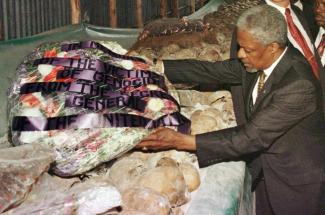Kofi Annan
Special relationship with Africa

Kofi Annan was elected to the highest office of the United Nations in 1996 with a strong endorsement from the USA. He held the office for ten years. With his exceptional polyglot background, he was seen at the time as the prototypically credible UN diplomat. Because of the circumstances of his election, however, he was also considered “America’s poodle”. He seemed charismatic but also conflict-shy, popular but also easily influenced by Washington.
Accordingly, African opinion was divided on Secretary-General Annan. Off the record, an African at the UN said back then: “He is not really one of us.” He was particularly not forgiven for his failure to prevent the Rwandan genocide in 1994, or at least take some meaningful action against it. At the time, he was the UN-Undersecretary-General for Peacekeeping Operations.
When he visited Rwanda later on, then already as Secretary-General, he got a cool reception. In parliament, there was stony silence when Annan entered the chamber to deliver a speech.
His “war on AIDS” in the late 1990s was another divisive issue. It may have won him favour in the west but not necessarily in Africa. Though infection rates were particularly high across the continent, some government officials were still recommending garlic as a remedy for AIDS back then. Annan stuck to his guns and told a press conference in the presence of then South African President Thabo Mbeki, one of the most prominent AIDS deniers, that it was high time to face the facts and change course.
The reaction of the political elite was similarly subdued when Annan presented a report on the causes of conflict in Africa in 1998. Thirty years after gaining independence, he wrote, the African continent had to look beyond its colonial past, which in itself was not a sufficient explanation for Africa’s many crises. Speaking bluntly, he warned that “corruption, nepotism, complacency and abuse of power” mattered too. His words were not music to all African ears.
Annan himself in contrast was fully aware of his African identity. He prided himself on having done more for Africa than for any other region in the world. During his time in office, he launched a reform for peacekeeping operations to avoid another disaster like Rwanda’s. He persuaded the members of the UN to adopt the “responsibility to protect” civilian populations from mass crimes.
It was also at Kofi Annan’s initiative that a Global Fund to Fight AIDS, Tuberculosis and Malaria was set up in 2002. But his greatest achievement was perhaps the adoption of the Millennium Development Goals (MDGs) in 2000, which evolved into the Sustainable Development Goals (SDGs) in 2015. The MDGs were universal in scope but directly targeted Africa. The MDGs were a world’s first: eight tangible objectives to overcome the worst evils of our time – scourges such as hunger and poverty.
“I think I have made a contribution by putting development, poverty and hunger firmly on the international agenda,” Annan said towards the end of his tenure.
Despite his international career, Annan always felt close to his home continent, as he once told this author in an interview. He described his childhood in Ghana as the “most formative time” of his life; he was “deeply rooted” in Africa, he said, and felt a constant longing for its climate, its landscapes and its people.
Yet Annan spent only around 25 of his 80 years in Africa. The rest of his life was divided mostly between the US and Europe, where he began his career as an administrative officer with the World Health Organization (WHO). Annan started out at the lowest staff level for university graduates. Over the next 35 years, he climbed the career ladder to the highest UN office. He was not only the first black African to be appointed to the post, he was also the first – and so far only – UN Secretary-General to ascend through the ranks within the organisation. What is more, he was the first UN chief to be awarded the Nobel Peace Prize during his lifetime.
The times when Africans viewed Annan critical are long past. Instead they became reconciled with this celebrated policymaker. Detractors are rarely heard anymore. On the contrary, after his death Annan seems to have been placed on a pedestal right next to Nelson Mandela – universally admired and a source of inspiration.
Friederike Bauer is a freelance journalist specialising in foreign affairs and global development.
info@friederikebauer.de














